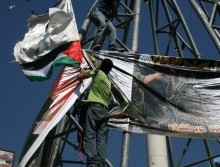
Despite what they may want you to believe the Palestinian flag and isn’t welcome everywhere. Illustrative. By Joshua Spurlock
Sweden may have recognized a Palestinian state that the United Nations has not, but the policy governing the international song competition Eurovision hasn’t either—despite being hosted in Sweden’s capital city. According to an initial posting of their draft flag policy reported by The Jerusalem Post, the Palestinian and ISIS flags are among the ones not permitted to be brought to the contest by spectators to avoid political controversy at the event. Israel and the United States have long argued the Palestinians shouldn’t be recognized as a state at this time, and some in Europe apparently agree—even if a bit awkwardly.
The European Broadcasting Union (EBU), which owns Eurovision, tried to dance around the position with a statement on their Facebook page apologizing for the posting of “a non-exhaustive list of examples” of flags prohibited by the venue. They said they requested that the official policy, which doesn’t have specific examples, be published instead. The EBU apologized for the situation, but as of Sunday the position to prohibit the Palestinian flag had not been rescinded. Not surprisingly, the Palestinians weren’t happy.
A report by Asharq Al-Awsat said Palestinian official Saeb Erekat had sent a letter to EBU president saying the move was offensive to them. Ironically, it was offense that the EBU was seeking to avoid by disallowing the Palestinian flag—along with other disputed territories’ banners.
The Asharq Al-Awsat report said the flag policy had asked their fans to “respect and appreciate the non-political nature of the Eurovision Song Contest.”
The EBU Facebook statement apologized for the situation the flag examples caused, but didn’t appear to back down. “The organizers understand and acknowledge the sensitivities of presenting a selection of flags of organizations and territories, each of them of very different nature. The organizers apologize to everyone who feels offended by the list.”
(By Joshua Spurlock, www.themideastupdate.com, May 1, 2016)
